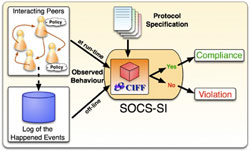Intelligent agents reasoning about Web services
Offering principles, methodologies and architectural patterns, Service Oriented Architectures (SOAs) have emerged as a new paradigm for structuring inter-/intra-business information processes. Web services composition, where business functionalities are encapsulated in software components and can be invoked through a stack of Internet standards, provides a practical instance of these architectures. In this context, the need for more sophisticated standards and in particular, for run-time testing of conformance to rules and specifications motivated the exploitation of the Society Constraint IFF framework. SC-IFF was developed within the SOCS project to provide a formal language for defining agent interaction protocols. Its operational counterpart is mainly based on the IFF abductive proof procedure and can be used for verifying the compliance of individual web services to global protocols or choreographies. SC-IFF has been integrated in 'SOCS society infrastructure' (SOCS-SI), a Java software application able to monitor agent interactions and forward them to SC-IFF for reasoning. SOCS-SI receives as input the choreography's specifications along with the events happening, and provides to the user the results of SC-IFF computations on conformance issues through a Graphical User Interface. Besides providing for conformance verification at run-time by checking immediately incoming events from various sources, SOCS-SI is able to analyse log files containing relevant events. SOCS-SI, together with its proof procedures constitute an attractive framework for Web service designers to reason about expectations, social protocols and properties in a setting where information is partial. Moreover, it may pave the way for new concepts in agent society engineering, driven by reasoning about properties and helped by formally grounded verification tools.



